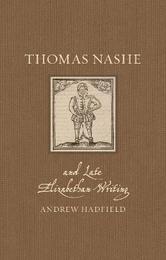
|
Thomas Nashe and Late Elizabethan Writing
Hardback
Main Details
| Title |
Thomas Nashe and Late Elizabethan Writing
|
| Authors and Contributors |
By (author) Andrew Hadfield
|
| Series | Renaissance Lives |
|---|
| Physical Properties |
| Format:Hardback | | Pages:256 | | Dimensions(mm): Height 216,Width 138 |
|
| Category/Genre | History |
|---|
| ISBN/Barcode |
9781789146875
|
| Audience | |
|---|
| Illustrations |
28 illustrations, 17 in colour
|
|
Publishing Details |
| Publisher |
Reaktion Books
|
| Imprint |
Reaktion Books
|
| NZ Release Date |
10 May 2023 |
| Publication Country |
United Kingdom
|
Description
An overview of the life and work of the scandalous Renaissance writer Thomas Nashe. This book provides an overview of the life and work of the scandalous Renaissance writer Thomas Nashe (1567-c. 1600), perhaps the only English author whose work led to the closure of theatres and the widespread banning of printed books. Nashe was famous for writing the scurrilous novel The Unfortunate Traveller (1594), but as Andrew Hadfield shows, there was much more to his career than this brilliant work. Nashe played a vital role in establishing English Renaissance theatre, collaborating with Ben Jonson, Christopher Marlowe and William Shakespeare. He was involved in religious controversies; wrote pornographic poetry; reflected on the terrifying impact of the plague on London; and wrote intricate sentences that saw him celebrated as one of the finest prose stylists of the age.
Author Biography
Andrew Hadfield is Professor of English at the University of Sussex. He is the author of a number of works on early modern literature and culture, including Lying in Early Modern Culture (2017), Edmund Spenser: A Life (2012) and Shakespeare and Republicanism (2005).
Reviews"Thomas Nashe was a bright, fierce light in Elizabethan literature, whose work was banned by the church authorities. From secretly circulated pornography to the herrings of East Anglia, and from Puritan propaganda to the first English novel, Nashe is always productive and provocative. Andrew Hadfield's lucid new life opens up these funny, savage, deeply topical works for a new readership, emphasizing their range, verve, and specificity. Hadfield's skill is in contextualizing without overshadowing the literary brio of the writing, and in recovering the Nashe whom all his contemporaries--including Shakespeare--wanted to emulate."--Emma Smith, Hertford College, Oxford (UK)
|